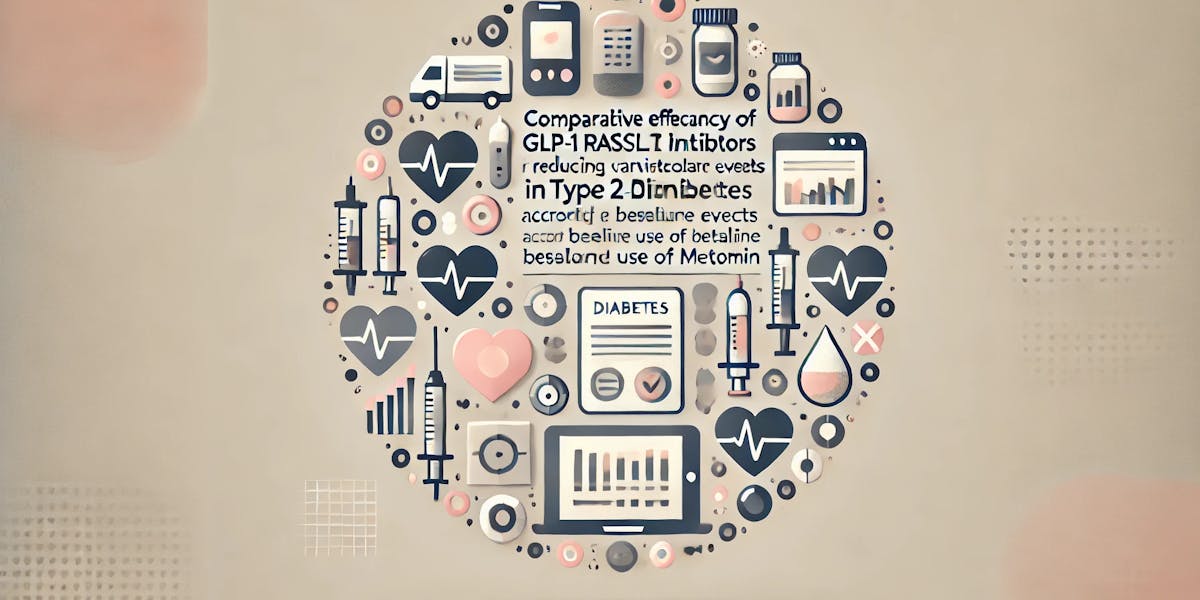Cardiovascular Impact of GLP-1 RAs and SGLT-2i in T2DM
European Journal of Medical Research

Summary
This study systematically reviewed and analyzed randomized controlled trials (RCTs) evaluating the cardiovascular effects of SGLT-2 inhibitors and GLP-1 receptor agonists in type 2 diabetes patients, both with and without baseline metformin use. Results indicated that these drugs reduce major adverse cardiovascular events (MACE), hospitalization for heart failure (HHF), and cardiovascular death regardless of metformin use.
Study Design
Interventions
Study Type
Outcomes
Duration and Size
Study Population
Age Range
Sex
Geography
Other Criteria
Methodology
Following PRISMA guidelines, four databases were systematically searched for RCTs assessing cardiovascular outcomes in T2DM patients using SGLT-2i or GLP-1 RAs. Data extraction focused on major adverse cardiovascular events and secondary endpoints.
Interventions
Interventions included SGLT-2 inhibitors such as dapagliflozin and empagliflozin, and GLP-1 receptor agonists like liraglutide and semaglutide, analyzed for cardiovascular outcomes.
Key Findings
Both drug classes reduced cardiovascular risks independently of baseline metformin use, with no significant interaction effects detected.
Comparison with other Studies
Comparisons with previous CVOTs confirm these drugs' cardioprotective effects regardless of metformin usage.
Journal Reference
Zhang Y, Li Z, Hao Y. Comparative efficacy of GLP-1 RAs/SGLT-2 inhibitors in reducing cardiovascular events in type 2 diabetes. Eur J Med Res. 2025;30:13. doi:10.1186/s40001-024-02241-4.
Related and Discussions
GLP-1 Receptor Agonist Therapy With and Without SGLT2 Inhibitors in Patients With Type 2 Diabetes and Cardiovascular Disease
GLP-1 Receptor Agonists vs. SGLT-2 Inhibitors: The Gap Seems to Be Narrowing
GLP-1 Receptor Agonists-SGLT-2 Inhibitors Combination Therapy and Cardiovascular Outcomes in Patients With Type 2 Diabetes and Acute Myocardial Infarction
Cardiovascular, Kidney, and Safety Outcomes With GLP-1 Receptor Agonists in Type 2 Diabetes: A Meta-Analysis
GLP-1 Receptor Agonists and SGLT-2 Inhibitors in Patients With Type 2 Diabetes and Cardiovascular Disease: A Meta-Analysis
A Methodological Framework for Meta-analysis and Clinical Interpretation of Subgroup Effects in Diabetes Care
GLP-1 Receptor Agonist Therapy With and Without SGLT2 Inhibitors in Patients With Type 2 Diabetes: A Meta-Analysis
The Effect of DPP-4 Inhibitors, GLP-1 Receptor Agonists, and SGLT-2 Inhibitors on Cardiorenal Outcomes: A Network Meta-Analysis
Does combining an SGLT-2 drug with a GLP-1 receptor agonist provide additive cardiovascular benefits?
Study finds combined use of GLP-1 receptor agonists and SGLT-2 inhibitors associated with lower risk of major adverse cardiovascular events
In patients with type 2 diabetes, SGLT-2 inhibitors and GLP-1 receptor agonists reduced cardiovascular and renal outcomes
SGLT-2 inhibitors and GLP-1 R agonists: How and where do they work and when and why to use
Effects of GLP-1 receptor agonists and SGLT-2 inhibitors on cardiovascular and kidney outcomes in Asian vs. White populations
Stay informed. Stay ahead.
Subscribe now for the latest breakthroughs, expert insights, and cutting-edge updates in diabetes care—delivered straight to your inbox.